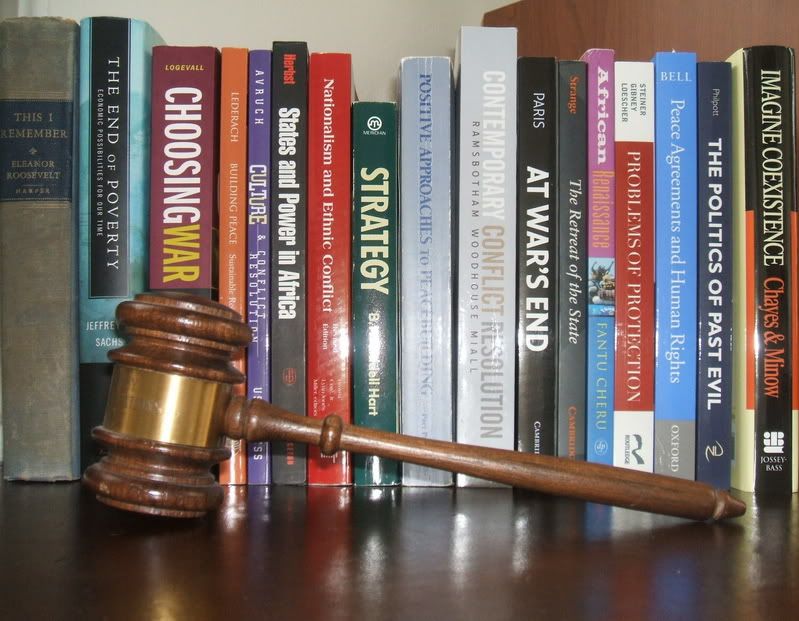Because I'm a dork, I several hours this weekend doing my usual pre-election candidate research. If you haven't done that yourself yet, I recommend you get started.
Looking at the presidential race, my mind was basically made up there, and the wealth of information available through all types of media, as well as questionnaires the candidates have answered and items on their websites reaffirmed my choice. There being no ballot issues in my jurisdiction, and since I live in a colonized city-state, I didn't have that much to do.
I'm not going to tell you every single person I intend to vote for, though I will mention a few. Especially useful resources were the
Washington Post (the voter guide moreso than their endorsements), the DC chapter of the
League of Women Voters (find your local chapter -- they do great stuff!), and the
Gay and Lesbian Activists Alliance, which is a local, not national, organization.
After reading that stuff, plus candidate websites (where I could find them), I found myself having to seriously think about two races: the At-Large DC Council race (two seats), and the Ward 1 State Board of Education race (1 seat). Ward 1, where I reside, is not voting for a ward rep to the DC Council this year (stay tuned for 2010). Other local races for shadow senator and shadow representative don't excite me because none of the candidates excite me, the at-large seat on the Board of Education is a one person race, so you either like him or not, and the delegate to the U.S. House is a pretty easy choice when you compare the candidates.
So that at-large race: there are 2 open seats, one of which needs to go to a non-Democrat (under the law that states that 2 of the 4 total at-large seats need to be held by someone of the non-majority party). The Democratic incumbent is Kwame Brown. The official Republican candidate is Patrick Mara. The Republican incumbent, Carol Schwartz, is running a write-in campaign. There are also three independents (Michael Brown, Mark Long, and Dee Hunter), and Statehood Green Party candidate David Schwartzman. Personally, I really like Carol Schwartz, especially after the way she's acted on the issues I raised in
my last post (writing the mayor in opposition to proposed changes, grilling Peter Nickles at his confirmation hearing). She's also a fiscal conservative in a city that frankly needs more of that. We certainly don't agree on everything, but she believes in holding government accountable, so she gets my vote (write in her name, and connect the arrow).
That leaves me one other choice. My research leads me to support David Schwartzman, but since he's also a non-Democrat, that vote would basically cancel out my vote for Schwartz. Thus I'll also vote for Kwame Brown, the incumbent Democrat, since a vote for him won't count as a vote against Carol since he's already in the majority party. The other so-called independents are basically job-seeking Democrats, and Micheal Brown seems hell-bent on running for every office open until he gets on. And Patrick Mara just seems shady, especially after having met him. As an aside, why oh why can't we vote for these two seats entirely separately, instead of all lumped together?
The other race then is the State Board of Education seat. This reconstituted Board advises the State Superintendent of Education (not the DC Public Schools Chancellor) on issues related to academic standards and compliance with federal law. The Board and State Superintendent oversee all public education institutions in DC, including DCPS and all charter schools. Here in Ward 1 we have one of the few contested races for a seat on this new Board. Two of the four choices, Pamela M. Johnson and Dotti Love Wade, get incredible props for being concerned parents/community activists, however their grasp of the issues they'll face seems a little weak. That leaves Lillian Perdomo and Shelore Williams, both with long records on education issues and a firm grasp of what they'll be doing and where they want to go. Yet it's Perdomo's record of engaging parents through her grassroots multicultural outreach work and her committment to social justice issues that put her on top for me. Read her bio and see for yourself.
Now, your homework is to Google all of the above, as I'm too tired to look up all those links to individual candidate sites again. I'm happy to help if you get stuck.
Happy voting! Polls in DC are open from 7am to 8pm Tuesday, and you can still vote early tomorrow.
P.S. This week I'm leading the election coverage over on Practical Peaceniks. Be sure to check out my introductory post, and check back there throughout the week. And don't worry, I'll always save my most irreverent bile for this space. :)



















